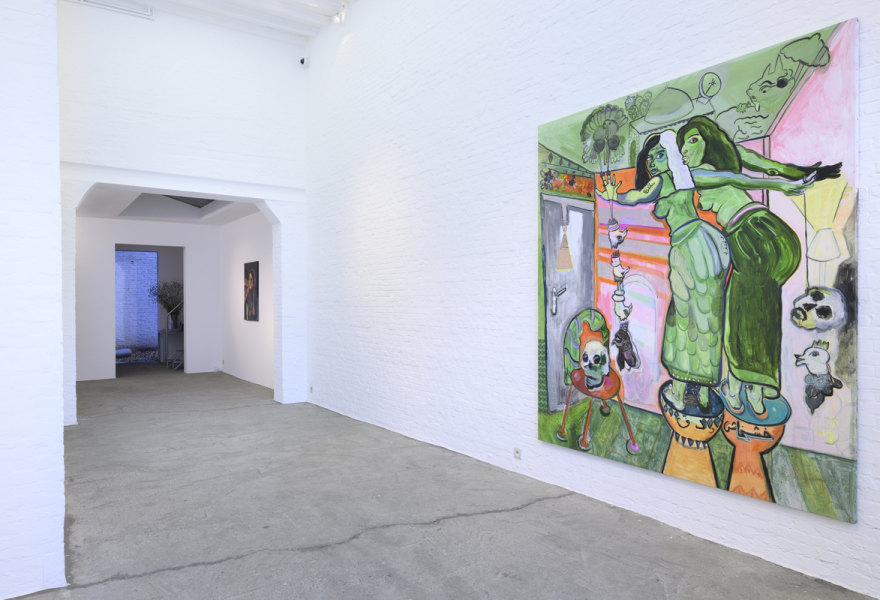03 january 2023, Flor Linckens
Mounira Al Solh: Lovers, Nahawand and Saba
Between 11 and 28 January 2023, Zeno X Gallery in Antwerp will once again be showing the exhibition 'Mounira Al Solh: Lovers, Nahawand and Saba', in which the artist shows a series of new paintings and works on paper.
The Lebanese artist Mounira Al Solh is known for her ability to address complex and controversial social and political issues in a nuanced and well-thought-out way. Her use of personal stories in paintings, videos, drawings, installations and performances produces meaningful works that, despite their heavier themes, are also characterised by a certain lightness and humour. She playfully invites the viewer to explore topics that are also central to political and social discourse: from migration and cultural exchange to themes such as gender, identity, trauma, displacement and the diverse ways in which we remember things. Sometimes her own body plays a literal role in this. Al Solh's work is thought provoking and because her work is so personal it strikes an important chord in a society in which there is an increasing desire for authenticity and a sense of community.

Born in Beirut in 1978, the artist grew up in a period marked by conflict and political instability. This has influenced her vision and perspective. Her experiences of living in different countries and cultures have coloured her practice, which often focuses on cooperation and establishing dialogue. Al Solh uses a lively and dynamic palette in a wide range of colours, which she layers in complex and structured compositions.
Al Solh also uses traditional fabrics and embroidery from the Middle East in her practice. She is known for her tents, which are regularly shown at major art fairs such as Frieze. These tents, made of traditional and embroidered fabrics, often serve as backdrops for performances and talks, and are intended to evoke a sense of home and belonging. At Frieze, for example, her tent was used as a location for performances and interactive discussions, and it functioned as a kind of refuge at the fair in which you could reflect and escape the hectic pace. In 2015, she created a bustling street market in MoMA's atrium, complete with stalls, vendors, and performances. This interactive 'Hamra Street' installation, combined with a series of videos, was designed to evoke the vibrant and diverse neighborhood of Hamra in Beirut and invited visitors to actively explore the space.

Her exhibition of at Zeno X Gallery shows a series of new paintings, works on paper and a film. These are inspired by the music scene of Beirut in the 1950s and 1960s and the film industry of Egypt, Syria and Morocco — and in particular the personal memories this evokes in her. Al Solh's exuberant use of colour refers to the flamboyant sets of TV shows and concerts from the Middle East. The title of the exhibition refers to key names in Arabic, Turkish and Persian music, and the Arabic words in Al Solh's paintings evoke certain associations and add rhythm to the compositions. The works also deal with trauma and injustice, including in relation to the Lebanese October Revolution of 2019 and the large-scale explosion in the port of Beirut in 2020. The film 'The Un-Musical Vase' is a compilation of self-made videos in which Al Solh dances and sings and explores the boundaries between the private and public sphere.

Al Solh studied painting at the Lebanese University in Beirut, followed by an education at the Gerrit Rietveld Academy in Amsterdam and a residency at the Rijksakademie van Beeldende Kunsten from 2006 to 2008. Her work has been shown at the MoMA, Centre Pompidou, The Art Institute of Chicago, the Mori Art Museum in Tokyo, the KW Institute for Contemporary Art in Berlin, the Center for Contemporary Arts in Glasgow, the Van Abbemuseum in Eindhoven, the Stedelijk Museum in Amsterdam and during dOCUMENTA 14 in Kassel. In 2017 her work was part of the main exhibition of the Venice Biennale.

